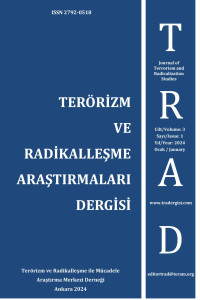Abstract
The United Kingdom's departure from the European Union (EU) in 2016, commonly known as Brexit, has presented unique challenges for Northern Ireland. Northern Ireland, which has a troubled history full of violent conflicts, has been negatively affected by this change in UK-EU relations The reintroduction of a 'hard border' on the island of Ireland has resulted in increased securitisation in the economic, social, and political spheres of Northern Ireland. With Brexit, the possibility of disrupting the peace environment provided by the 1998 Belfast Agreement has arisen and the future or integrity of the United Kingdom has been one of the main topics of discussion on the agenda. In this context, the Irish Republican Army (IRA), a significant actor in the Northern Ireland conflict, has resurfaced. Despite having engaged in a disarmament process between 2001 and 2005, the IRA's activities have increased since 2016, causing societal concern. This study argues that Brexit has provided an opportunity for the IRA to pursue its goal of a 'united Ireland'. The accuracy of this claim is examined within the framework of securitisation theory in the field of international relations. The objective of this study is to shed light on the factors contributing to the resurgence of the IRA in recent years and to assess the risks faced by the United Kingdom in light of Brexit and securitisation theory.
Keywords
References
- Tütmez, E.D. (2024). IRA’nın Yeniden Yükselişinde Brexit’in Rolü ve Güvenlikleştirilen Alanlar. Terörizm ve Radikalleşme Araştırmaları Dergisi, 3(1), ss. 96-121, DOI: 10.61314/traddergi.1406468
Abstract
Birleşik Krallık’ın Avrupa Birliği’nden (AB), 2016 yılında düzenlediği referandum ile ayrılması (Brexit), Kuzey İrlanda için benzersiz zorluklar yaratmıştır. Şiddetli çatışmalarla dolu sorunlu bir geçmişe sahip olan Kuzey İrlanda, Birleşik Krallık ile AB ilişkilerindeki bu değişimden olumsuz yönde etkilenmiştir. İrlanda adasına yeniden ‘sert bir sınırın’ çizilmesi, Kuzey İrlanda’da toplumsal, siyasal ve ekonomik alanlarda güvenlikleştirmeye yol açmıştır. Brexit’le, 1998 Belfast Anlaşması’yla sağlanan barış ortamının bozulması ihtimali doğmuştur. Birleşik Krallık’ın geleceği ve bütünlüğü ise, gündemin ana tartışma konularından birini oluşturmuştur. Bu süreçte Kuzey İrlanda çatışma tarihinin etkili aktörlerinden olan İrlanda Cumhuriyeti Ordusu’ndan (IRA) yeniden söz edilmeye başlanmıştır. 2001-2005 yılları arasında silahsızlanma sürecine giren ayrılıkçı terör örgütünün, 2016 yılı sonrasındaki faaliyetlerinde artış yaşanması toplumda endişe yaratmıştır. Bu çalışmada Brexit’in, IRA’nın ‘birleşik bir İrlanda’ hedefini gerçekleştirmesinde çıkış yolu oluşturduğu ileri sürülmektedir. Bu ifadenin doğruluğu ise çalışmada, uluslararası ilişkiler disiplininde yer alan güvenlikleştirme teorisi çerçevesinde test edilmektedir. Çalışmanın amacı, Brexit ve güvenlikleştirme teorisi doğrultusunda IRA’nın son yıllardaki yükselişindeki arka plana ışık tutmak ve Birleşik Krallık’ın karşılaştığı riskleri değerlendirmektir.
Keywords
References
- Tütmez, E.D. (2024). IRA’nın Yeniden Yükselişinde Brexit’in Rolü ve Güvenlikleştirilen Alanlar. Terörizm ve Radikalleşme Araştırmaları Dergisi, 3(1), ss. 96-121, DOI: 10.61314/traddergi.1406468
Details
| Primary Language | Turkish |
|---|---|
| Subjects | International Security, Terrorism in International Relations |
| Journal Section | Research Articles |
| Authors | |
| Early Pub Date | January 27, 2024 |
| Publication Date | January 27, 2024 |
| Submission Date | December 18, 2023 |
| Acceptance Date | January 23, 2024 |
| Published in Issue | Year 2024 Volume: 3 Issue: 1 |


